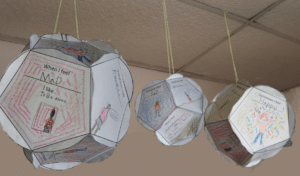We talk a lot in our blog posts about the importance of reading to and sharing books with kids as one of the best ways to help get kids ready for school. But what if you are someplace where you don’t have a book handy? Or if you are having difficulty finding books in your native language? Or you are tired of reading and sharing the same books over and over?
Storytelling has the same great benefits as reading and sharing books AND it is a great way to bond and have fun with your child. In fact, it is probably the oldest literacy-building tool. Many cultures use storytelling as a way to pass history, traditions, and language on to younger generations. They can also be used to teach new skills.
And you can tell stories anywhere, in the car going to the grocery store, waiting at the bus stop, or sitting in the bleachers waiting for a sibling’s soccer game to start.
Some parents might feel nervous about telling stories. You might wonder what you could talk about. Or how to make things exciting. We offer a few tips and resources.
- Tell your child about your childhood. Kids love to hear what their parents were like when they were their kid’s age or before their child was born. You could tell your child about:
- Your favorite things to do
- A favorite pet
- Where you lived (especially if you lived somewhere other than where your child is growing up)
- Family traditions and celebrations
You can also share experiences with your child about challenges that you faced that are like things that your child might be facing. This can help your kids know that you understand what they are experiencing. You can also offer them some ways to cope. When you tell your child stories about scary or sad experiences, it can help them if you can include suggestions about positive ways to deal with the situations- things that you did or that you thought of later.
- Share stories from your (or different) culture or background. Many cultures have stories that have been passed down for generations. These include folktales, myths, or fairy tales. This can be an important way to teach children about their own backgrounds as well as help them learn about other cultures.
- Tell children stories about themselves as babies and toddlers. Kids love to hear about themselves.
- Make up a whole new story! Let your imagination run wild! You can find inspiration from things around you, like the person crossing the street in front of your car. Maybe he met a monster earlier in the day. What did he do? Or maybe you had a special story that you liked as a child. Use that as a basis and add your own touches. You can also use story and writing prompts. Here are a just few to get you started:
- Today, a monkey climbed in the bedroom window….
- Did I ever tell you about the time I sailed on a pirate ship?
- I found an old map in the backyard one day…..
- When I was queen/king of my own kingdom….
- One day the dinosaurs came back…
- Co-create a story with your child. Letting your child make up stories with you will build their language skills and their imaginations. Take any story prompt and then take turns making up the next part of the story. You can also help them to tell their own stories. Remember here that it is the process of learning to tell stories that is important. They don’t have to make sense. In fact, the more imaginative (or even longer and winding), the better!
As always, the most important thing about these activities is that you and your child have fun! Don’t worry about whether your story is the best that your child has ever heard. The fact that it is a special story that you shared with them will be the most important. And being able to laugh out loud is a bonus!
Resources for parents about storytelling:
Tips for parents: https://planbee.com/blogs/news/10-storytelling-tips-for-parents
Involving kids in story-telling: https://www.huffpost.com/entry/storytelling_b_1438047
Fun activity for finding story prompts: https://carrotsareorange.com/story-bag-storytelling-preschoolers/
The value of telling family stories: https://www.theatlantic.com/education/archive/2013/12/what-kids-learn-from-hearing-family-stories/282075/
[divider type=”standard” text=”Go to top” full_width=”no” width=”1/1″ el_position=”first last”]
Text: © Kids In Transition to School 2021
Image: © Didesign021 | Dreamstime.com





